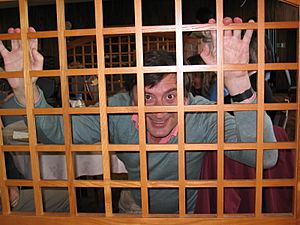Gordon Plotkin facts for kids
Quick facts for kids
Gordon Plotkin
FRS FRSE MAE
|
|
|---|---|

Plotkin in 2005
|
|
| Born |
Gordon David Plotkin
9 September 1946 Glasgow, Scotland
|
| Alma mater | University of Glasgow (BSc) University of Edinburgh (PhD) |
| Known for | Programming Computable Functions Unbounded nondeterminism Operational semantics Domain theory |
| Awards |
|
| Scientific career | |
| Fields | Logic Mathematics Computer science |
| Institutions | University of Edinburgh Laboratory for Foundations of Computer Science School of Informatics University of Glasgow |
| Thesis | Automatic methods of inductive inference (1972) |
| Doctoral advisor | |
| Doctoral students |
|
Gordon David Plotkin, born on September 9, 1946, is a brilliant computer scientist. He works at the University of Edinburgh in Scotland. He is famous for his ideas about how computer programs work. He helped create ways to understand how computers follow instructions. His work has greatly influenced how programming languages are designed.
Gordon Plotkin's Education
Gordon Plotkin studied at two well-known universities in Scotland. He went to the University of Glasgow first. There, he earned his Bachelor of Science degree in 1967. Later, he continued his studies at the University of Edinburgh. He completed his PhD in 1972. His main teacher for his PhD was Rod Burstall.
Gordon Plotkin's Career and Research
After finishing his studies, Gordon Plotkin stayed at the University of Edinburgh. He became a very important part of the computer science department. He helped start a special group called the Laboratory for Foundations of Computer Science (LFCS). He founded it with two other famous scientists, Rod Burstall and Robin Milner.
Plotkin's work focuses on understanding how computer programs behave. He developed something called structural operational semantics. This is a way to describe exactly what a computer program does step by step. He also worked on denotational semantics. This is another way to give meaning to programming languages. His ideas have helped many people understand and create better computer programs.
He has also taught many students who became successful computer scientists themselves. Some of his former students include Luca Cardelli and Eugenio Moggi.
Awards and Honours for Gordon Plotkin
Gordon Plotkin has received many important awards for his work. In 1992, he was chosen as a Fellow of the Royal Society (FRS). This is a very high honour for scientists in the United Kingdom. He is also a Fellow of the Royal Society of Edinburgh (FRSE). He is a member of the Academia Europæa and the American Academy of Arts and Sciences. These are groups that recognize top thinkers and researchers.
In 2012, he received the Milner Award. This award recognized his important research into how programming languages work. His ideas have had a lasting impact on how these languages are designed.
The Royal Society described his contributions. They said he helped in areas like Artificial Intelligence and Logic. He also worked on understanding how languages are structured. His main contribution was creating a framework for computer science. This framework helps explain how programming languages get their meaning. He also worked on topics like how computers handle different tasks at the same time.
 | Delilah Pierce |
 | Gordon Parks |
 | Augusta Savage |
 | Charles Ethan Porter |

